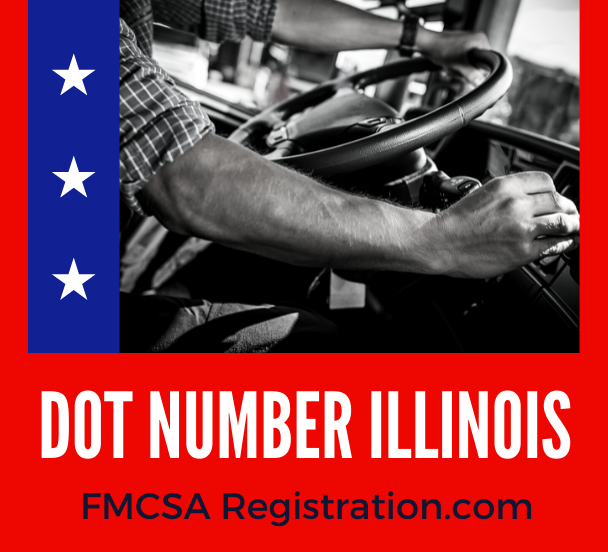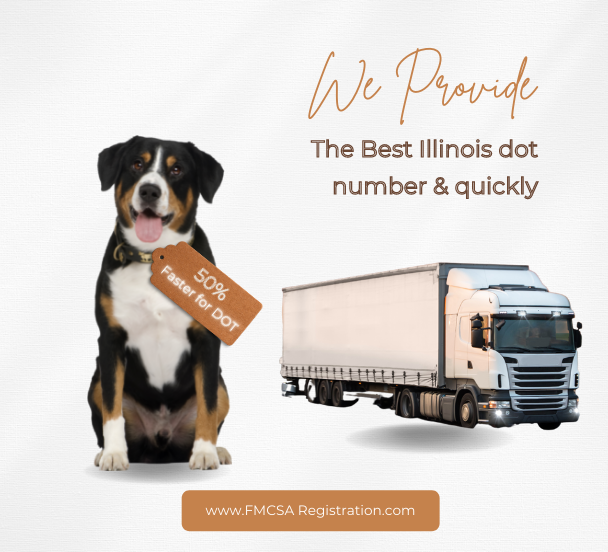

An Illinois DOT Number is a unique identifier assigned by the Illinois Department of Transportation (IDOT). It is required for commercial vehicles operating within the state. The primary purpose of this number is to ensure that all commercial vehicles comply with state regulations. It also makes it easier for authorities to track and manage commercial vehicle operations.
While both the Illinois DOT Number and the USDOT Number serve as identifiers for commercial vehicles, they are used in different contexts. The Illinois DOT Number is specific to the state of Illinois. It is necessary for vehicles that operate only within state lines (intrastate). On the other hand, the USDOT Number is a federal identifier issued by the Federal Motor Carrier Safety Administration (FMCSA). It is required for vehicles that operate across state lines (interstate). If your business operates both within Illinois and across state lines, you will need both numbers.
Having an Illinois DOT Number is crucial for commercial vehicle operators in the state. It ensures compliance with state laws and helps avoid penalties. This number is essential for maintaining a good safety record, which can impact your business’s reputation and insurance rates. Additionally, it simplifies the process of vehicle inspections and audits by the IDOT. By obtaining an Illinois DOT Number, you show your commitment to safety and regulatory compliance, which can enhance your credibility with clients and partners.

An Illinois DOT Number is necessary for certain commercial vehicle operators within the state of Illinois. If you operate a commercial vehicle and meet specific criteria, you must obtain this number. Generally, this includes vehicles that transport passengers or haul cargo for a fee. It also applies to vehicles that carry hazardous materials, regardless of whether they are paid for their services. The key factors include vehicle weight, type of cargo, and the purpose of the operation.
Not all vehicles need an Illinois DOT Number. However, if your commercial vehicle has a gross vehicle weight rating (GVWR) of 10,001 pounds or more, you will need one. This also applies if you are using the vehicle to transport more than 8 passengers (including the driver) for compensation or more than 15 passengers without compensation. Additionally, vehicles carrying hazardous materials that require placarding must have an Illinois DOT Number. These regulations ensure that only qualified operators manage large or potentially dangerous vehicles on Illinois roads.
The requirements for an Illinois DOT Number can vary based on whether your operations are intrastate or interstate. Intrastate operations refer to those that occur solely within Illinois state borders. If your commercial vehicle operates only within the state, you will need an Illinois DOT Number. For interstate operations, which involve crossing state lines, a USDOT Number issued by the FMCSA is required. If your business involves both intrastate and interstate activities, you will need both numbers to comply with state and federal regulations.
Applying for an Illinois DOT Number might seem complicated, but breaking it down into steps can make it easier.
1. First, gather all necessary information about your business and vehicles. This includes details like your business name, address, and the type of vehicles you operate.
2. Next, visit the official website of the Illinois Department of Transportation (IDOT) to start your application. Follow the prompts to fill out the required forms. Be prepared to provide information about your vehicle’s weight, type of cargo, and whether you transport passengers.
3. Once you have filled out the forms, review them carefully to ensure all information is correct. Submit the forms through the website. After submission, you will receive a confirmation email from IDOT. Keep this email for your records.
If you prefer not to handle this process alone, FMCSA Registration can help. We specialize in the application process and can ensure everything is completed correctly.
When applying for an Illinois DOT Number, you need to have specific documents and information ready. This includes your business’s legal name, address, and contact details. You also need to provide your Employer Identification Number (EIN) or Social Security Number (SSN).
For your vehicles, you must know their gross vehicle weight rating (GVWR), the type of cargo they carry, and whether they transport passengers. If your vehicles transport hazardous materials, you will need to specify this as well.
Additionally, have your insurance details handy, as proof of insurance is often required. This documentation ensures that your application process goes smoothly and without delays.
For expert help with gathering and submitting the required paperwork, contact FMCSA Registration. We can guide you through every step.
You can apply for an Illinois DOT Number either online or offline. The online method is generally faster and more convenient. By visiting the IDOT website, you can complete and submit your application from the comfort of your home or office. This method also allows for quicker processing and confirmation.
For those who prefer the traditional way, you can apply offline by mailing your completed forms to the IDOT. While this method is still effective, it may take longer due to postal delays and manual processing.
Whether you choose online or offline, make sure to double-check all information before submission to avoid errors. Need help deciding which method is best for you? FMCSA Registration can assist you with both online and offline applications. Let us handle the details so you can focus on your business.

Getting an Illinois DOT Number comes with certain fees. These fees can vary based on different factors, such as the type of vehicle and the nature of your business. Typically, there are initial registration fees that you must pay when you first apply. These fees cover the cost of processing your application and issuing your DOT number. It’s essential to budget for these initial costs to ensure you can complete your registration without any issues.
When it comes to paying for your Illinois DOT Number, you have several options. Most commonly, payments can be made online using credit or debit cards. This is a convenient and quick way to ensure your fees are paid on time. Some services may also accept electronic checks or bank transfers. If you prefer to handle payments offline, you might be able to send a check or money order to the Illinois Department of Transportation. Always double-check the accepted payment methods to avoid any delays in your registration process.
Besides the primary fees for obtaining your Illinois DOT Number, there may be additional costs to consider. These could include fees for renewing your DOT number or updating your registration information. Sometimes, there are hidden fees that you might not be aware of initially. For instance, if you need to make changes to your registration after submission, there could be extra charges. It’s important to read all the details and fine print to understand any potential hidden fees fully.
Navigating these costs can be complex, but you don’t have to do it alone. FMCSA Registration can help you understand all fees and ensure you are fully prepared.

Once you have your Illinois DOT Number, staying compliant is crucial. Regular maintenance of your DOT number involves adhering to various state regulations. You must consistently update your vehicle and business information. This includes changes in your business address, the types of vehicles you operate, or the nature of your cargo. Ensuring your insurance information is current is also vital. Maintaining accurate records helps avoid potential issues during inspections or audits by the Illinois Department of Transportation (IDOT).
Keeping your Illinois DOT Number active requires periodic renewals. You must renew your registration at specified intervals, which helps keep your information up-to-date with the IDOT. Failing to renew on time can lead to penalties or even suspension of your DOT number. Regular updates are also necessary whenever there are changes in your business operations. For example, if you add new vehicles to your fleet or change the type of cargo you transport, you must update your registration accordingly. Staying proactive with updates and renewals ensures uninterrupted operations for your business.
Non-compliance with Illinois DOT regulations can result in severe penalties. These can range from fines to the suspension or revocation of your DOT number. Operating without a valid Illinois DOT Number can lead to hefty fines and legal issues.
1. Failure to Obtain a DOT Number
Penalty: Fines up to $10,000 per violation
Action: Ensure all commercial vehicles have a valid DOT Number before operating.
2. Failure to Display DOT Number
Penalty: Fines and possible out-of-service orders
Action: Properly display the DOT Number on both sides of all commercial vehicles.
3. Failure to Maintain Updated Information
Penalty: Fines and potential suspension of DOT Number
Action: Regularly update business and vehicle information with the FMCSA.
4. Operating with a Suspended or Revoked DOT Number
Penalty: Severe fines and potential legal action
Action: Cease operations immediately and rectify the issues causing suspension or revocation.
5. Violation of Safety Regulations
Penalty: Fines, out-of-service orders, and increased scrutiny
Action: Adhere strictly to all safety regulations, including driver qualifications, hours of service, and vehicle maintenance.
6. Failure to Complete Biennial Update
Penalty: Fines and possible deactivation of DOT Number
Action: Submit the MCS-150 form every two years to update your registration.
7. Inaccurate Reporting
Penalty: Fines and potential legal consequences
Action: Ensure all information provided in applications and reports is accurate and truthful.
8. Non-Compliance with Record-Keeping Requirements
Penalty: Fines and potential audits
Action: Maintain thorough and accurate records of all operations, maintenance, and driver logs.
9. Unauthorized Transportation of Hazardous Materials
Penalty: Substantial fines and severe legal consequences
Action: Obtain necessary permits and adhere to all regulations for transporting hazardous materials.
10. Failure to Conduct Regular Inspections
Penalty: Fines and increased likelihood of vehicle out-of-service orders
Action: Conduct regular vehicle inspections and maintenance to comply with safety standards.
Additionally, non-compliance can tarnish your business’s reputation and affect your ability to secure contracts or insurance. It’s essential to stay informed about all regulatory requirements and ensure you meet them consistently.
Applying for an Illinois DOT Number can be a bit tricky. Many applicants face common problems such as filling out the forms incorrectly or not having all the necessary information ready. Sometimes, people forget to include details like their business address or vehicle specifications. Another frequent issue is misunderstanding the requirements for different types of operations, like intrastate versus interstate. These mistakes can lead to delays in the approval process or even rejections.
To make the application process smoother, start by gathering all required documents and information ahead of time. This includes your business details, vehicle information, and insurance proof. Double-check everything before you submit it. If you’re unsure about any part of the form, it’s better to ask for help than to guess. Take your time to read through all instructions carefully. Using the online application method can also speed things up since it’s usually processed faster than offline applications.
Another tip is to keep a checklist of all the steps you need to complete. This helps ensure you don’t miss anything important. If you’re feeling overwhelmed, consider getting professional help. FMCSA Registration can guide you through the entire process, making sure everything is done correctly.